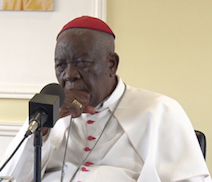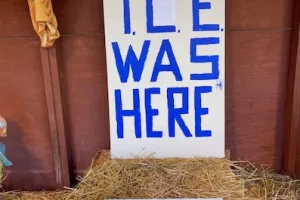Cameroon: Anglophone separatists ask 'Where is the Vatican?'

The late Cardinal Christian Tumi Image Vatican News
"The Vatican should act like the body of Christ, supporting the oppressed," says a representative of an Anglophone Cameroon group, interviewed by Independent Catholic News.
Barrister John Fru Nsoh of the so-called Interim Government of the Anglophone Restorationists justified the abduction of some priests as a protest against "the Church's attitude of siding with the Francophone dominated Government of Yaounde which is waging war on them."
Nevertheless, Barrister John Fru Nsoh acknowledged "the tremendous work done on behalf of the English-speaking people by individual priests" in the troubled North West and South West regions of the Central African country.
Priests and missionaries are being targeted by all sides, including government security services, in the deepening conflict in Anglophone Cameroon. Armed militias wishing to restore the Anglophone regions to their independent, pre-colonial status, abducted Cardinal Christian Tumi last November. Tumi, who died in April, was aged 89 at the time. He was interrogated before being released unharmed, and he later wrote about his ordeal.
Vatican envoy Cardinal Pietro Parolin visited Cameroon in early 2021, urging Cameroon's President Paul Biya to participate in inclusive peace negotiations. The secretary of state also met civil society leaders in the Anglophone region and celebrated Mass in Bamenda. However, Ambazonian "restorationists" accused him of "wining and dining" with local officials and representatives of the government.
Respected international rights monitors allege that the Biya administration is burning Anglophone villages, imprisoning opposition politicians, lawyers and journalists, and attacking civilians, forcing more than 700,000 to flee their homes. An estimated 3,500 have been killed, although separatists insist the number of dead is closer to 18,000. Armed militia have enforced a school boycott, keeping a million children out of education for the last four years.
The medical aid group MSF reports that the needs of women and children forced to live in the bush are increasing. The Cameroon government banned MSF from working in the Anglophone region last year, accusing its staff of being too close to insurgents, a charge rejected by MSF. The charity released an appeal on June 23rd, saying that 1.4 million people out of a population of six million are in need of humanitarian support. Children hiding in the bush are particularly affected by malaria and diarrhea, and 30% of hospitals in the region are not function due to the conflict.
On 7 June, the US Secretary of State, Antony Blinken, announced that America would impose travel bans on individuals in Cameroon and beyond who stand in the way of peace-making. In response to a question from Lord Alton, the minister Lord Ahmad said the UK would "monitor the impact of the announcement."
Meanwhile, on 9 June, the UK Parliament had its only chance to debate Britain's recent trade deal with Cameroon. In an adjournment debate sponsored by the Liberal Democrats, opposition MPs raised concerns about the Biya government's human rights record. Sarah Olney MP for the Liberal Democrats questioned why there had been no parliamentary scrutiny of the trade deal, apart from the 30-minute adjournment debate.
For the British government, the under-secretary of state for international trade, Graham Stuart, told MPs that "the violence seems to have decreased," a point disputed by charities, activists and religious groups in the Anglophone region, as well as rights monitors such as Human Rights Watch, Amnesty International and International Crisis Group.
Stuart told MPs that the government "encourages greater trade with countries like Cameroon as it provides an opportunity to offer a hand up to those most in need of creating the opportunities to employment they need to rise out of poverty."
Cameroon observers argue that it is not poverty at the root of the conflict in the Anglophone region, but the marginalisation of the English-speaking minority by the Francophone majority over many decades. Protests began in 2016 when the government tried to impose French law on the English Common Law courts, and the French curriculum and Francophone teachers on Anglophone schools that teach a British curriculum.
The Swiss NGO, the Centre for Humanitarian Dialogue, has been offering to mediate inclusive peace talks, but the Cameroon government and most of the armed militia persist in pursuing a military strategy at enormous cost to civilians.


















